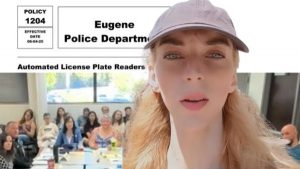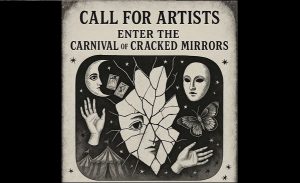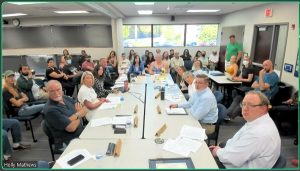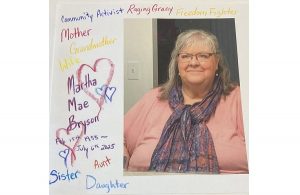4J students promote climate education at City Club
7 min read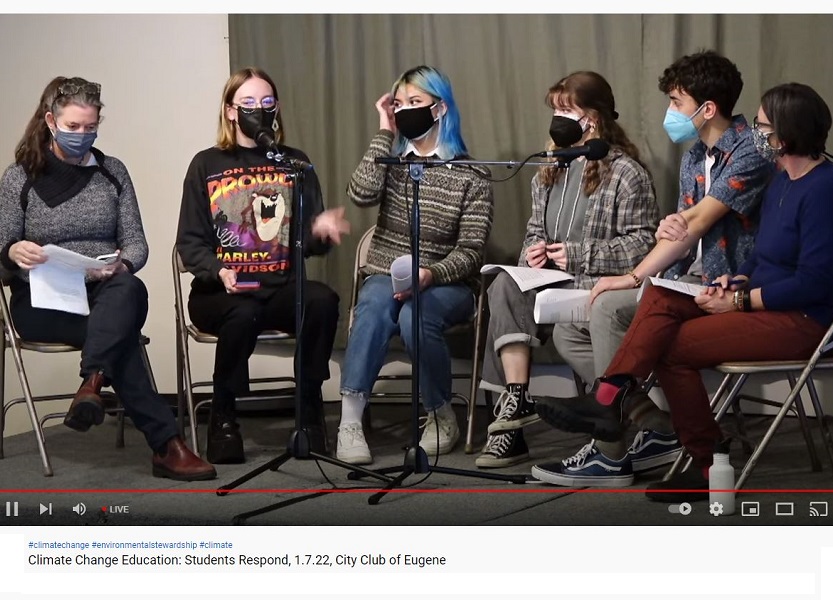
Eugene student leaders are working with faculty and staff to produce climate change education.
The City Club this month introduced 4-J student leaders focused on climate education.
[00:00:05] Kaarin Knudson: My name is Kaarin Knudson and I am the City Club President-Elect. We welcome our speakers: Bodhi Coelho from South Eugene High School; Sandra Cronin from North Eugene High School; Olivia Plumb from Sheldon High School; and Lotte Rohde from Churchill High School, as well as our moderators, Sarah Ruggiero Kirby, Eugene 4-J secondary science specialist, and Tana Shepard, Eugene 4-J climate energy and conservation specialist.
[00:00:33] Tana Shepard: Hi, I’m Tana Shepard. I use she/her pronouns and I’m a teacher on special assignment for climate energy and conservation. Also the EWEB education grant partnership coordinator, and the Love Food, Not Waste coordinator for District 4-J.
[00:00:48] Sarah and I are involved in some work outside of our teaching roles and we are part of a group called the Oregon Educators for Climate Education across the state. And it is completely off hours it is on our own time. But it is a group that is working towards, at the state level, bringing a legislative piece to the floor, hopefully for 2023. We’ve been in contact with (Sen.) Floyd Prozanski.
[00:01:11] Sarah Ruggiero Kirby: And I’m Sarah Ruggiero Kirby. I am the secondary science specialist for Eugene 4-J and also coordinate Outdoor School for our elementary schools in the district.
Thank you for supporting
local citizen journalism
[00:01:21] Bodhi Coelho: I’m Bodhi Coelho. I use he/him pronouns and I’m from South Eugene. We are the 4-J Climate Justice Team. We’re a combination of students and staff and faculty from the 4-J high schools, and we aim to make climate education a more focal point in our schools.
[00:01:40] City Club Member: I’m a city club member . How are you doing at getting your fellow students engaged? How’s that going?
[00:01:47] Bodhi Coelho: At least for me, I’m seeing a lot more engagement with, um, with being responsible around food. Like my, my friend is vegan.
[00:01:56] I have a lot of vegetarian friends as well, and I personally have a lot to work on with my food consumption. In terms of rallying people together for that, it’s a very hard subject, especially even with teenagers, because food is very personal. A lot of people have dietary restrictions and it can be difficult to convince someone that yes, you can actually have a nutritious diet and, or like a sustainable diet with all the dietary needs that you have without eating meat or without eating dairy. Personally, I think that’s something for the future of our club, more promotion of, mindful eating, but it’s difficult, like you were saying.
[00:02:43] Olivia Plumb: I’m Olivia Plumb. I use she/her pronouns and I’m from Sheldon. I think to some extent, that’s why we care so much about education, is that when you have—this is more of a long-term solution—but when you have a whole generation of people who are fully educated about this, it’s not as hard to get people on board or agree with you or have these conversations, but it is really a challenge in the short term.
[00:03:09] Sandra Cronin: Hello. My name is Sandra Cronin. I go to North Eugene High School and I use she her pronouns.,
[00:03:15] Yeah. I do find it challenging to speak with other people that their views don’t exactly align or they’re not fully informed or they just don’t really want to listen. But going off of what Bodhi said, how food is very personal, I went vegetarian a few years ago and my friends saw that, my close friends, and they weren’t vegetarian, but then we had some discussions and we realized that you don’t have to be like fully vegetarian, even cutting meat out, like maybe once a week or twice a week or whatever, can still make a huge impact. But yeah. Once I went vegetarian and inspired, like several of my other friends to also go vegetarian. So I think it’s like kind of like a group effort. So if you set an example and you’re like showing how it works for you and how it can work for someone else, then it makes it easier because there’s often, well, I can’t be fully vegan, so there’s no point in doing it.
[00:04:16] Well, if you just cut out meat, like once a week, it also makes a big difference.
[00:04:20] Olivia Plumb: And that kind of concept can be applied to so many other areas in your life. Not just like the food that you eat, but just making small changes. It can, I mean, things like that can be really infectious to the people around you.
[00:04:33] Sandra Cronin: Yeah. So as a young person, I have been exposed, frequently to the impacts and what has happened due to climate change. And we have collectively not really known a world without climate change. We’ve been aware of the impact and we kind of feel a little bit helpless, when thinking about it, because as young people, we don’t have much power in terms of what can be done.
[00:05:06] Lotte Rohde: Hi, I’m Lotte Rohde. I use she/her pronouns and I go to Churchill High School. I grew up in Utah and I didn’t know what climate change was for a really long time. All I knew is that every year the snow would melt more and more, or the snow would turn black with pollution, but I didn’t really know why that was. And every time I would ask people who’d just say, ‘Oh, you know, it’s just like, it’s a kind of new normal,’ but I didn’t know what this new normal was.
[00:05:34] And then when I moved to California, I was then faced with different problems like wildfires and droughts. And I, once again, I didn’t really know why these things were happening. I just knew that it was the new normal that I was faced with. And I knew that it wasn’t the life that my mom had lived when she was younger.
[00:05:59] And so luckily when I moved to Oregon, I learned what climate change was and I was so excited that I finally had this name to put on it, but at the same time, I was like, ‘Oh, okay, so it’s not just me noticing these things. It’s an actual problem that we’re all facing in everyday life.’ And ever since then, I’ve just been really passionate about trying to figure out ways to help that.
[00:06:26] Bodhi Coelho: I think it’s pretty apparent, at least for us, that our climate education process has been very recent. So within our teenage years, and the reason why we want to play such a big focus on early climate education is because we didn’t get that really that much. And we really wish that we had, because it was very confusing as a child to be told that our world is basically dying and that we’re the ones who are going to be responsible for saving it. And we’re like, ‘What? What am I supposed to do about that?’ So if there’s this kind of gentle but realistic segue into climate education that kids can get from a young age, it just feels like they’re going to be more reassured and more likely to take action than our generation will be.
[00:07:19] Yeah. That helplessness, I think is, at least for me was, one of the big reasons why I joined this team. Like after just a few months, being with these people, like these amazing people I’m sitting here with, I feel much more solidified that there’s like actually something that we can do. Just being with people who think the same way and are actually thinking about action rather than just talking is really, really reassuring.
[00:07:44] John Q: Past president Scott Coltrane.
[00:07:46] Scott Coltrane: Scott Coltrane, city club member, and while you’ve been talking five different questions have come in through text message. The next question. Would it help to organize political boundaries by watersheds?
[00:07:58] Sarah Ruggiero Kirby: Mmm, great question.
[00:08:00] Tana Shepard: Can I talk about that. I love that question so much. Yeah, it really could. It’s some of the work that we’ve been doing with the other group that I mentioned is around different regions, so it’s counties, education service districts, but watersheds are really—and indigenous and tribal lands, obviously. Not obviously I shouldn’t say that it’s not obvious. And we are on Kalapuya land, et cetera, that hasn’t been mentioned today. But yes, the watersheds water is one of the most important things in our area.
[00:08:34] And so if we were to organize by watershed, it would be a very fascinating connection that humans could make to the area that they live in. Because no matter where you are, you’re in a watershed. And again, going with what the kids were saying, we’ve lost so much connection to the natural world and the resources that we’re actually taking from it regularly.
[00:08:56] And some of our watersheds are actually drying up because of companies like Nestle or others, so I think that’s very fascinating and intriguing and I want to investigate it more actually. Yeah.
[00:09:06] Sarah Ruggiero Kirby: And it’s going, there’s going to be a huge water redistribution as part of climate change, right? The water is going to become more and more of an issue. So that’s a fantastic question.
[00:09:15] Tana Shepard: And less snowpack. I mean, I could go on and on about water forever, but it is, there are heavy ramifications with the watersheds.
[00:09:23] John Q: In a world adapting to rapid climate change, Eugene student leaders focus on education and mutual aid.
